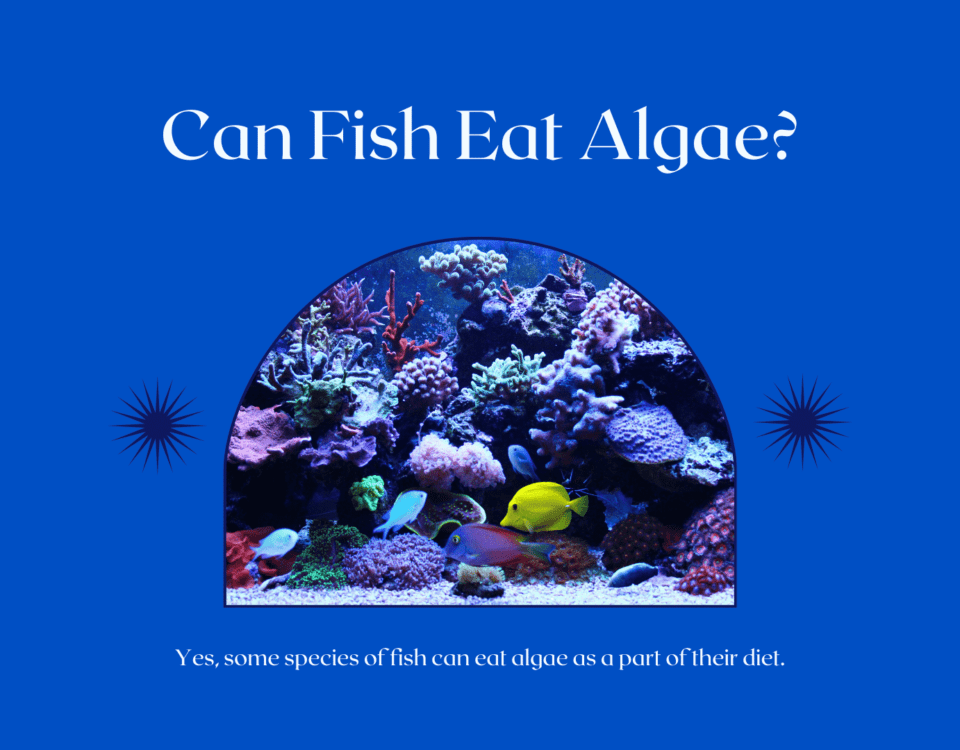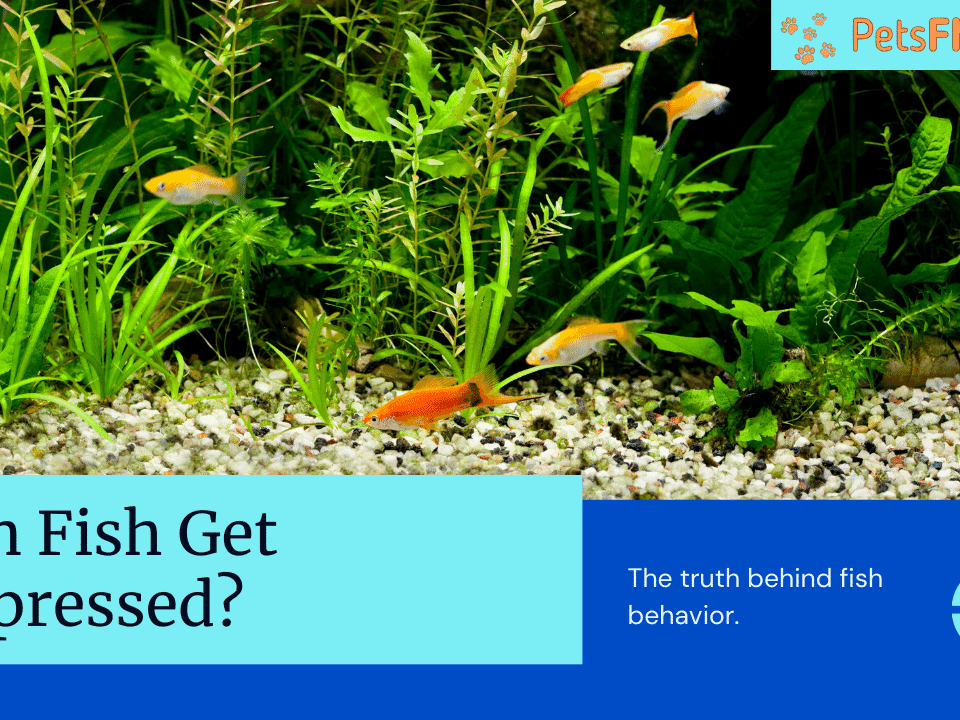


Is My Fish Depressed? The Red Flags to Watch For
February 25, 2024


16 Fish Species That Eat Algae (+Facts to Know)
February 26, 2024When we think of pets getting too chubby, images of pudgy dogs or corpulent cats might spring to mind, but have you ever wondered about our aquatic friends? Can a fish get fat? This intriguing question takes us on a dive beneath the water’s surface to explore the lives of our finned companions.
Like their land-based counterparts, fish can indeed experience changes in body weight, but the reasons and outcomes might surprise you. But here’s a quick answer:
Overfeeding, unsuitable diets, insufficient exercise, and genetic factors can lead to obesity in aquarium fish. Signs of obesity include a swollen belly, lethargy, swimming challenges, and altered body shape. Excess weight can damage internal organs, hinder swimming, and elevate the risk of illnesses such as fatty liver disease and fin rot.
Join us as we swim through the facts, debunk myths, and discover what affects the waistlines of the underwater world. Let’s embark on this fascinating journey to understand more about the health and well-being of fish.
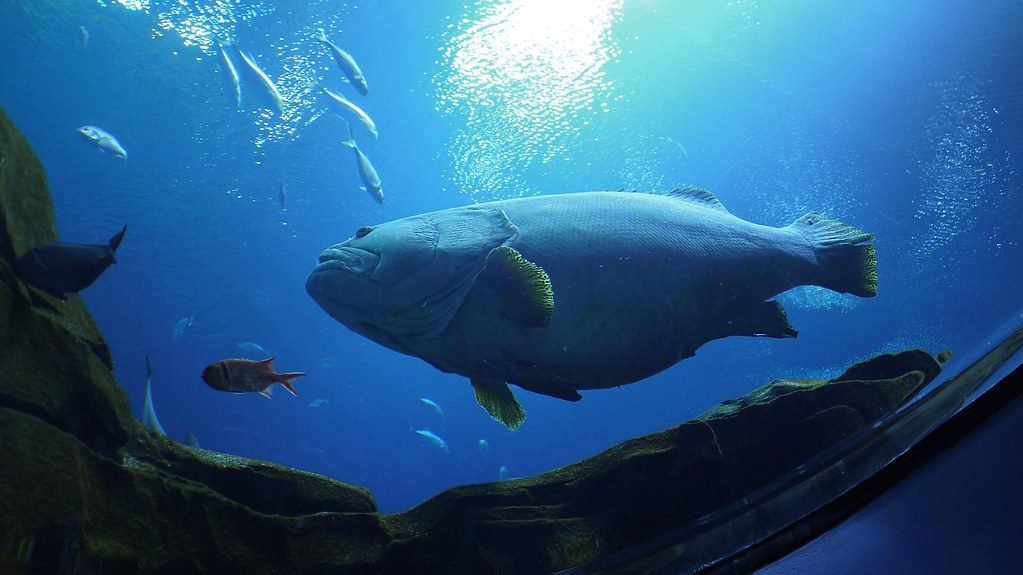

Fat Blue Fish
Understanding fish obesity
Just like people and pets, fish can get too fat, too! This happens when they eat more food than they need, don’t move around enough, or sometimes because of their genes.
If fish become overweight, they look rounder, move more slowly, and have trouble swimming. This extra weight isn’t good for them. It can hurt their insides and make them sick, with problems like fatty liver disease and fin rot.
Reasons behind fish gaining weight
Fish gaining weight can be influenced by several factors, often related to their environment, diet, and genetic predispositions. Here’s a closer look at the key reasons behind this issue:
1: Overfeeding
Overfeeding is a common mistake among fish owners, leading to significant weight gain in fish. In a controlled environment like an aquarium, fish have limited swimming space and burn off excess calories.
When fed more food than necessary, they can’t utilize all the energy, accumulating fat. Continuous overfeeding not only leads to obesity but can also pollute the water, further impacting fish health.
2: Carrying Eggs
Female fish that are gravid (carrying eggs) often appear swollen or larger, which is sometimes mistaken for obesity. This natural reproductive state is essential for the continuation of species and should not be confused with unhealthy weight gain.
However, it’s essential to ensure that the diet and environment support the health of egg-carrying fish without inadvertently contributing to actual obesity.
3: Dropsy
Dropsy is not a disease but a symptom of underlying issues, such as bacterial infections that cause fluid accumulation within the body and scale to stand out, giving a bloated appearance.
While dropsy reflects more of a critical health issue than obesity, the swollen appearance can be mistaken for excessive weight. Addressing the root cause is essential for the fish’s survival.
4: Constipation
Constipation in fish, often resulting from a diet low in fiber or overconsumption of certain foods, can lead to a bloated appearance.
Regular bowel movements are crucial for fish; without them, they can appear larger or suffer from health issues that mimic the appearance of obesity.
5: Improper Diet
Feeding fish an improper diet lacking essential nutrients or high in fats and carbohydrates can lead to unhealthy weight gain. Like humans, a balanced diet is critical for fish to maintain optimal health and prevent obesity. Ensuring a variety of foods that meet their nutritional requirements is key.
6: Genetic Factors
Just as some animals are more predisposed to weight gain, specific fish species or individuals may have a genetic propensity towards storing more fat. Understanding your fish species’ natural physiology and genetic background can help tailor their diet and care to prevent obesity.
7: Tumors
Tumors, both benign and malignant, can cause swelling or lumps in fish that may resemble obesity. These growths can significantly affect the fish’s health and mobility. Identifying and treating tumors requires professional veterinary care.
8: Sickness
Various illnesses can lead to symptoms that mimic obesity, such as swelling or bloating. Sickness can alter metabolism, fluid regulation, and the overall appearance of fish. Addressing the underlying health issues is crucial for restoring normal body conditions.
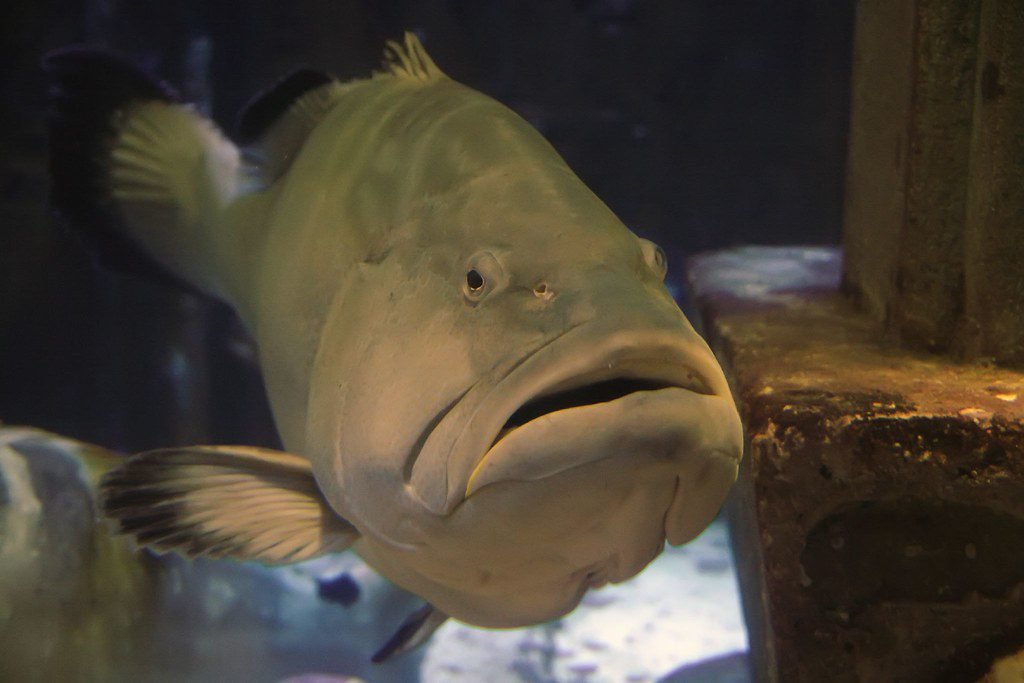

Fat Fish
What happens when your fish gains weight?
When your fish gains weight, it can lead to health issues and reduced quality of life. Overweight fish may struggle with swimming, become more susceptible to diseases, and face shortened lifespans.
Understanding the consequences can help prevent and address weight problems effectively.
1: Reduced Mobility
Excess weight can hinder a fish’s ability to swim correctly, affecting its mobility. This can lead to less interaction with the environment and other fish, impacting its overall well-being.
2: Increased Disease Risk
Overweight fish are at a higher risk of developing health issues, such as fatty liver disease, which can severely affect their internal organs and functions. The extra weight compromises their immune system, making them more susceptible to infections and diseases.
3: Breathing Difficulties
The added pressure on the body from excess weight can make it harder for fish to breathe, especially for species that rely on swim bladders for buoyancy. This can lead to stress and further health complications.
4: Shortened Lifespan
Carrying extra weight can significantly shorten a fish’s lifespan. The strain on their bodies from the additional weight and the increased likelihood of disease can lead to premature death.
5: Behavioral Changes
Overweight fish may exhibit changes in behavior, such as reduced activity levels, lethargy, or difficulty competing for food, which can affect their overall happiness and quality of life.
What can you do to prevent your fish from gaining weight?
Preventing your fish from gaining excess weight is vital to ensuring their health, longevity, and happiness. Adopting proper feeding habits and maintaining an optimal living environment can keep your aquatic friends in great shape.
1: Proper Feeding Practices
Adopt a balanced feeding schedule, providing the right amount and type of food for your fish’s dietary needs. Avoid overfeeding and remove uneaten food promptly to prevent pollution and excess calorie intake.
2: Balanced Diet
Ensure your fish’s diet is varied and nutritionally complete. Incorporate a mix of high-quality commercial foods, fresh and live options if suitable, to mimic natural dietary intake and prevent nutritional deficiencies or overindulgence in fatty foods.
3: Regular Monitoring
Keep an eye on your fish’s body condition and behavior, adjusting their diet and feeding schedule as necessary. Regular monitoring helps in the early detection of weight gain and enables timely interventions.
4: Adequate Tank Space and Enrichment
Provide sufficient space and environmental enrichment to encourage natural swimming behaviors and physical activity, helping fish burn calories and stay fit.
5: Controlled Breeding
For species prone to carrying eggs, manage breeding practices to ensure female fish aren’t constantly in a gravid state, which can be mistaken for obesity.
6: Regular Water Changes and Quality Checks
Maintain optimal water quality through regular changes and checks. Good water conditions support healthy metabolism and reduce stress, indirectly helping to manage weight.
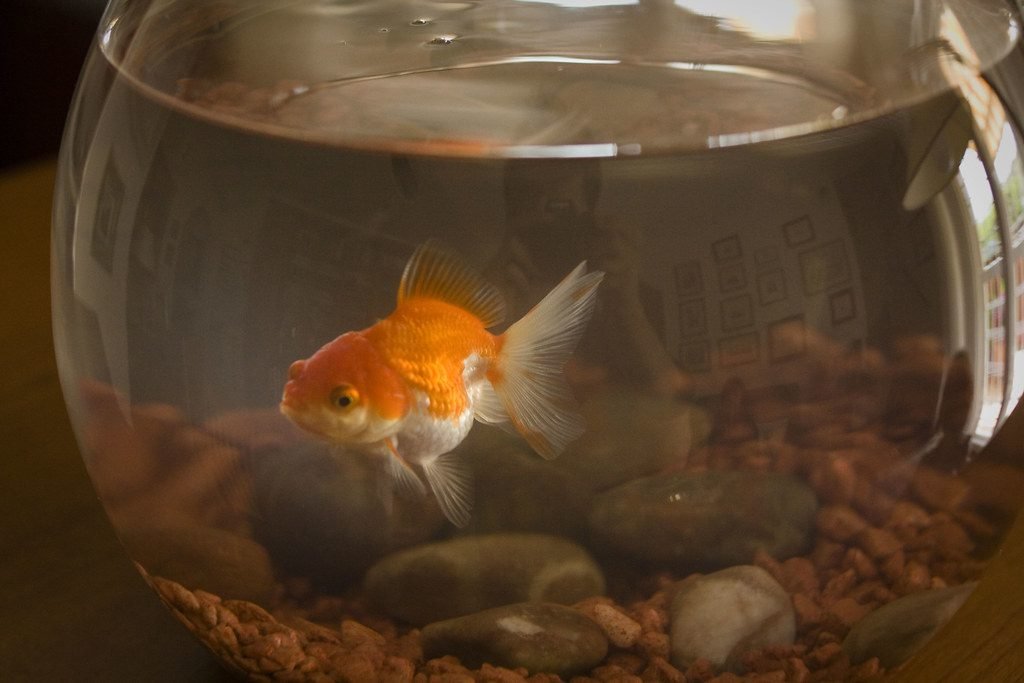

Orange Fish in Bowl
What can you feed your fish to maintain its weight and health?
Maintaining your fish’s weight and health involves providing a balanced diet that meets their nutritional needs. Here’s what you can feed your fish to keep them healthy and at an ideal weight:
1: Commercial Fish Food
Opt for high-quality commercial fish food tailored to your fish’s species. These foods are formulated to provide a balanced mix of proteins, carbohydrates, fats, vitamins, and minerals. Pellets and flakes are common, but choose one appropriate for your fish’s size and dietary requirements.
2: Live Foods
Live foods, such as brine shrimp, bloodworms, and daphnia, are excellent for mimicking the natural diet of many fish species. They’re nutritious, stimulate your fish’s hunting instincts, and provide physical activity.
3: Frozen Foods
Frozen foods offer the nutritional benefits of live foods with the convenience of long-term storage. They are a good source of protein and essential nutrients. Thawed frozen foods like krill, squid, and vegetables can be a part of a balanced diet.
4: Vegetables
Many fish species benefit from the inclusion of vegetables in their diet. Blanched peas, zucchini, spinach, and lettuce are great for herbivorous and omnivorous fish, providing fiber and essential nutrients.
5: Algae
For herbivorous species, algae wafers or sheets can be a staple in their diet, offering a rich source of plant-based nutrients.
6: Variety is Key
A varied diet is crucial for providing a range of nutrients and preventing boredom. Rotate between different types of food to ensure your fish receive all the necessary nutrients and to keep them engaged and active.
7: Portion Control
Feed your fish small amounts multiple times a day instead of one large feeding. This mimics natural feeding patterns, helps prevent overeating, and ensures food is consumed before it decomposes and affects water quality.
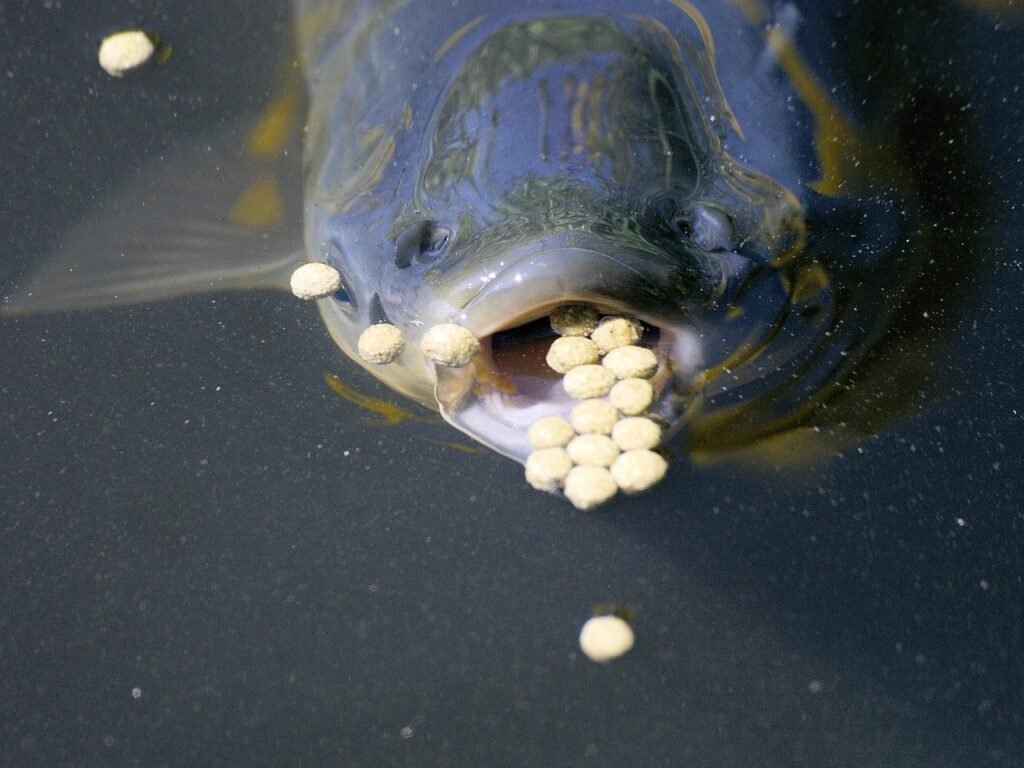

Feeding Fish
Can all types of fish become overweight?
Yes, regardless of species, most fish can gain excess weight if their diet and environment are not adequately managed. However, susceptibility to obesity can vary based on species, genetics, and living conditions.
How can I tell if my fish is overweight?
Signs that a fish may be overweight include a visibly enlarged abdomen, difficulty swimming or buoyancy issues, lethargy, and changes in behavior such as decreased activity levels. In some cases, the fish’s scales may appear stretched or protruding.
What is the best way to prevent my fish from becoming overweight?
The best prevention method is to ensure a balanced diet, avoid overfeeding, and provide a suitable environment that encourages natural behaviors and exercise. Regular monitoring of your fish’s health and body condition is also crucial.
How often should I feed my fish to maintain its health?
Feeding adult fish two to three times a day is generally recommended, offering only as much food as they can consume in a couple of minutes. The exact frequency and amount can vary depending on the fish species, age, and health status.
Can diet changes reverse obesity in fish?
Adjusting the diet and feeding practices can help manage and potentially reverse obesity in fish. Incorporating more varied and appropriate foods and controlling portion sizes can significantly contribute to weight loss and improved health. However, changes should be made gradually to avoid stress.
Conclusion
In conclusion, maintaining your fish’s ideal weight and health requires a balanced diet, proper feeding practices, and a suitable environment. Recognizing the signs of obesity and addressing them promptly can prevent health issues, ensuring your aquatic friends lead a long, vibrant life. Always prioritize variety and moderation in their diet.


